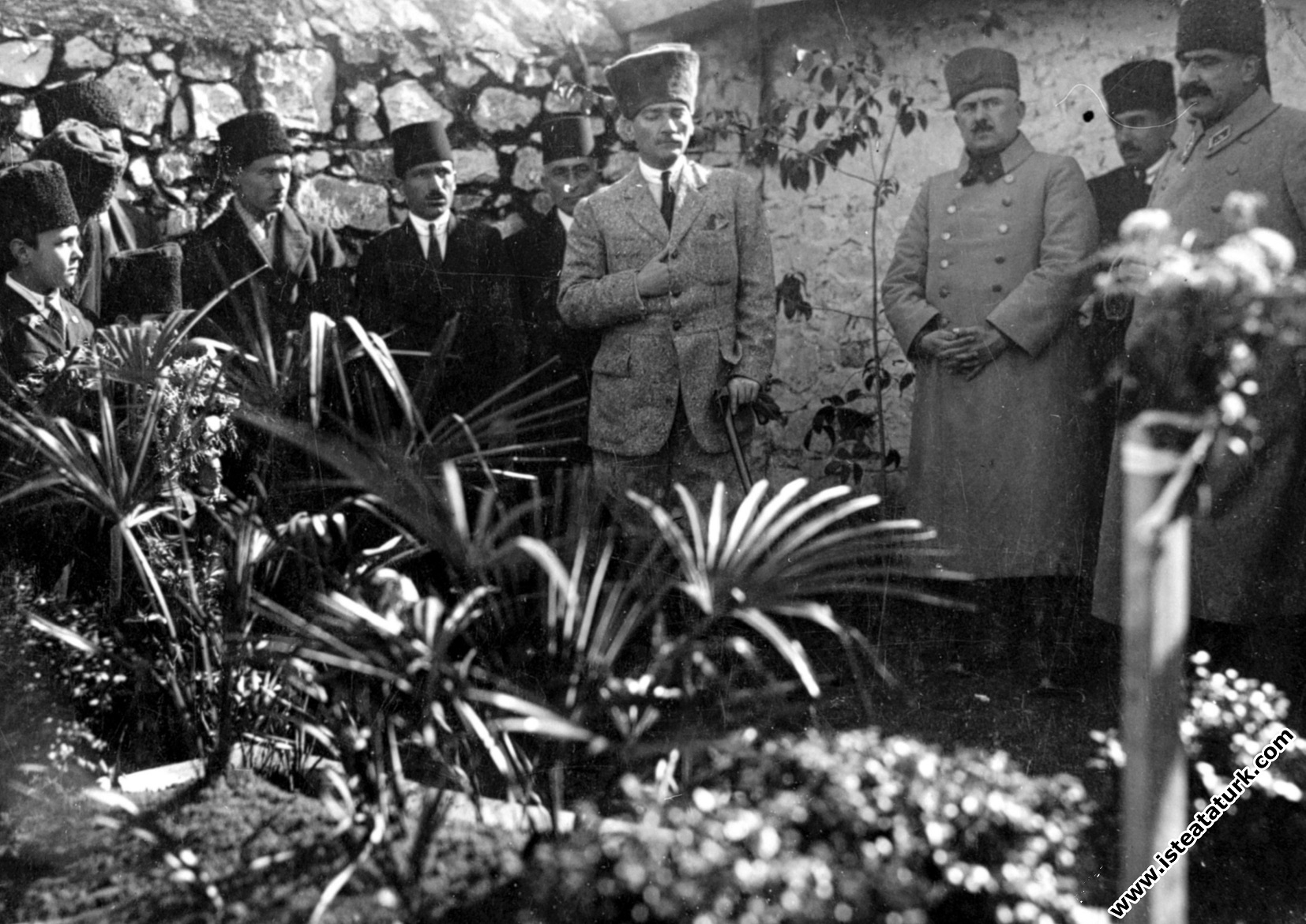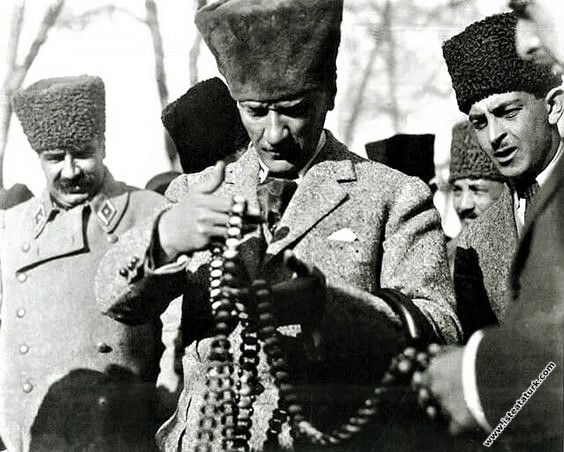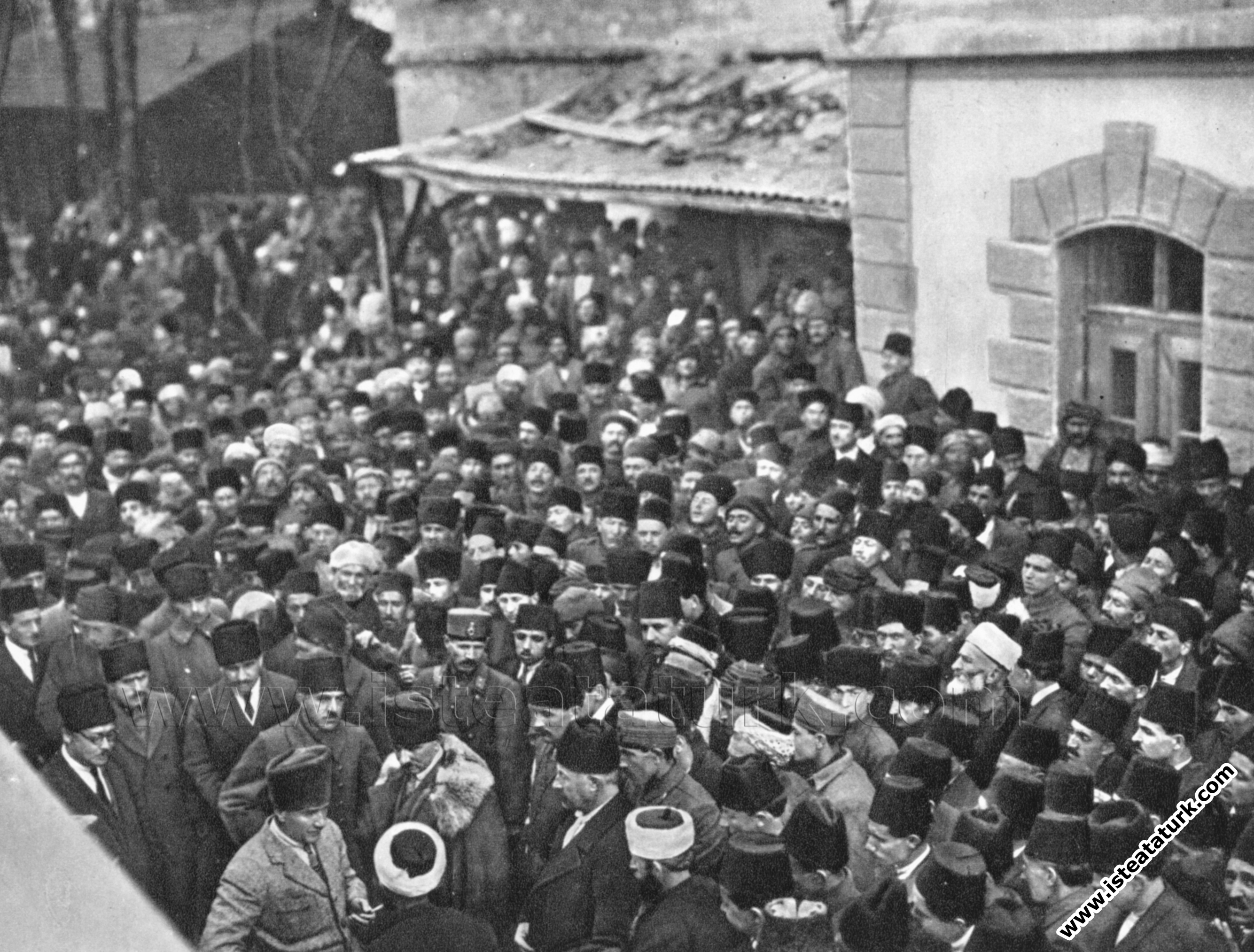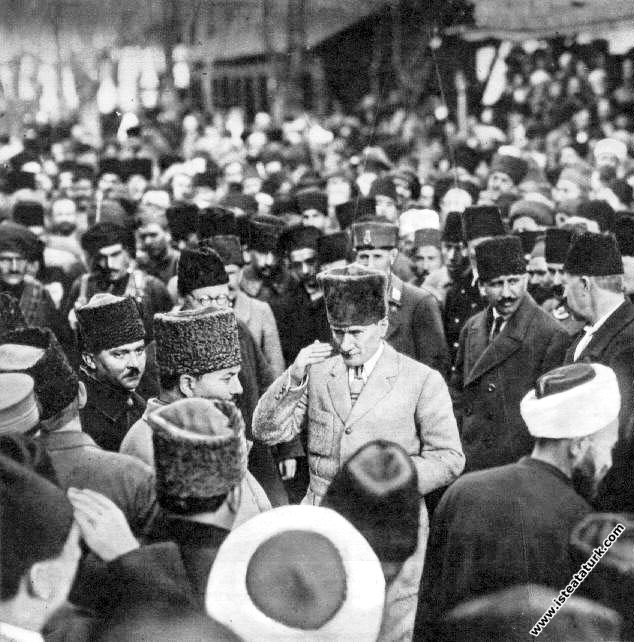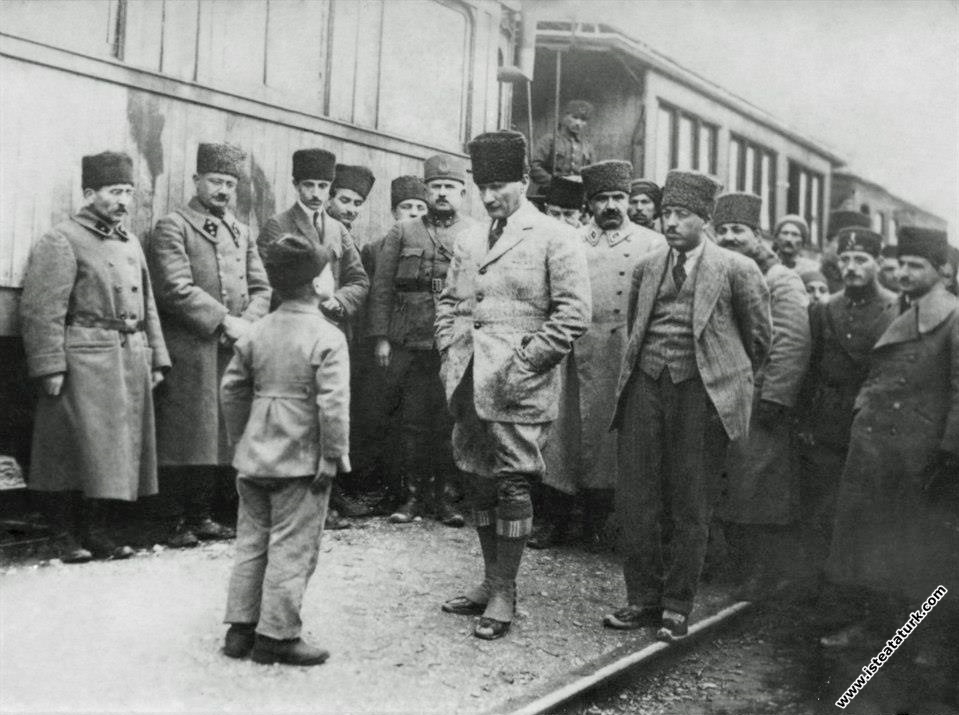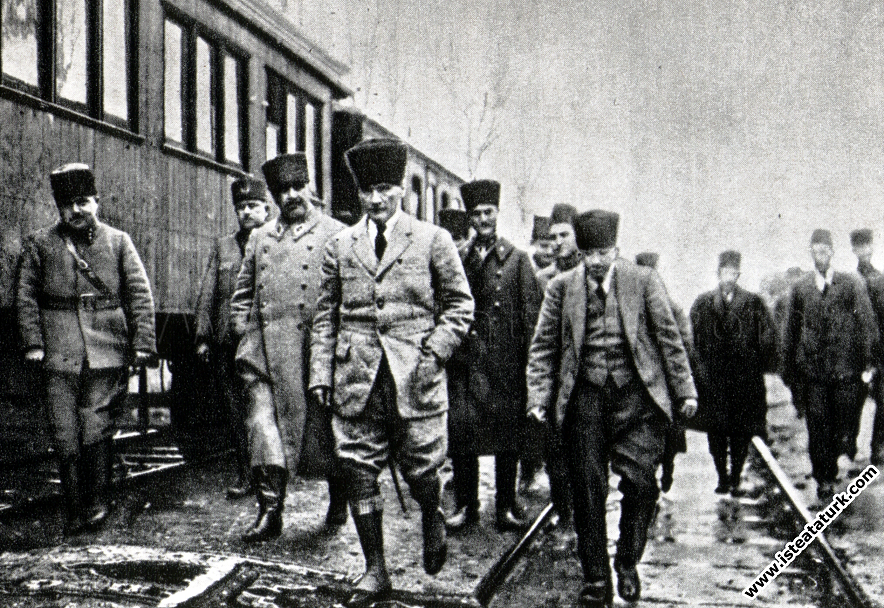Commander-in-Chief Mustafa Kemal visits the grave of his mother Zübeyde Hanım with Marshal Fevzi Çakmak and Kazım Karabekir Pasha. (27.01.1923)
Başkomutan Mustafa Kemal, annesi Zübeyde Hanım'ın mezarını Mareşal Fevzi Çakmak ve Kazım Karabekir Paşa'larla ziyaret ediyor. (27 Ocak 1923)
A BAD DREAM
Just before dawn, Gazi called Ali;
".. Is there any news?" he had asked. in Ali
".. Password received but not decrypted." he said. Mustafa Kemal looked at the commanding sergeant Ali sadly:
"..I know my mother is dead." said. "I had a dream, I was walking around the green fields with my mother. Suddenly a storm came and took my mother away."
When the deciphered telegram was given to him, he read it, closed his eyes, thought for a moment, and said:
".. We are not going to Izmir." said. "Let them turn the train to Izmit."
_%202.jpg)
Mustafa Kemal is in Eskişehir. (January 15, 1923)
On the evening of January 16, 1923, the editors of the Istanbul newspapers were invited to Izmir. He was going to hold a very important press conference.
The death of his mother was sadly reported in the telegram sent by Chief Aide Salih Bozok. Atatürk was trying not to show his sadness with two drops of tears falling on the telegram, but trying not to show it...
Zübeyde Hanım died on the evening of January 15, 1923 .
Mustafa Kemal, who had been running from front to front for those seven years, spent the best days in the headquarters and tents, received the news of his mother's death in a train car. The woman who loved him was no longer behind him.
A whole life that lasted with pain, longing and ended with happiness passed like this, it was exhausted like this...
On that day, he had the Commander-in-Chief Salih Bey write the following telegram in Izmir:
"Teahhur of the minute
It is Mujib-i Responsibility.
To Salih Bey, Seryaver of the Commander-in-Chief
The heartbreaking news you gave me greatly affected me. Have the deceased perform the ceremony in an appropriate manner. May Allah give life and peace to the nation."
Supreme commander
Gazi Mustafa Kemal
Source: Atatürk Research Center, Atatürk's Mother Zübeyde Hanım, Cemil Sönmez, 2nd Edition Ankara 1998, ISBN: 975-16-0942-9. Pages: 103-104
DEATH OF ATATÜRK'S MOTHER
(From Muzaffer Kılıç and Halil Nuri Yurdakul)
Atatürk's mother came to Ankara and settled in Ankara, but her health, which was already bad, deteriorated in a short time. After the doctors insisted that the sea air would be better than Ankara's high and harsh climate, he sent him to Izmir. He died there on January 15, 1923, in the summer mansion of Uşakkizadeler and despite the careful care of his future bride, Latife Hanım.
Atatürk was in Eskişehir that night. Chief aide Salih Bey (Bozok), who was in Izmir, informed him of this news by telegram.
It was answered promptly.
- "I am very touched by the sad news you have given. Have the deceased perform the ceremony in an appropriate manner."
A few days later we were in Izmir. As soon as she got off the train, she went to visit her mother's grave in Karşıyaka and her eyes filled with tears of sadness and excitement;
- "My mother is dead, there is one point of consolation for me in the face of this sad truth; the fact that she was buried in the holy lands of this beautiful Izmir, whose salvation is a goal for all of us. My mother suffered a lot for me. May Allah grant her a comfortable sleep there. let it." she sighed.
A few years later, one day, he saw the photograph of the tomb with marble sarcophagus and long epitaph, probably built for his mother by Ms. Latife, and he did not like it at all, especially in the inscription, "His Excellency Mustafa Kemal Pasha, the President of the Grand National Assembly of Turkey" . They didn't like the sentence that started.
One day, he said to General Secretary Hasan Rıza Soyak Bey, "You go to İzmir at the first opportunity, you have this sarcophagus and inscription removed, you have two big and long stones brought from the mountain, you have one fixed on the foundation as it is, and the other one is erected on the head. You can have it corrected and have it written, "Atatürk's mother Zübeyde lies here ." had given the order.
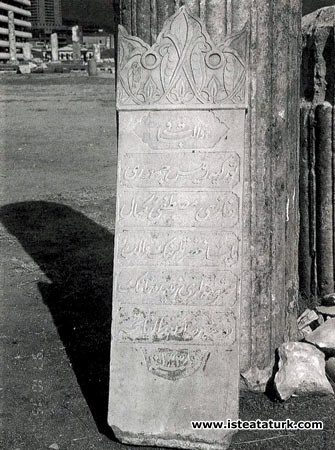
The inscription written by Latife Hanım says, word for word:
“Hüve'l-Baki. The Honorable Mother of the Republic of Turkey, Ghazi Mustafa Kemal Pasha, consenting to the spirit of Zübeyde Hanım, lillâhi'l-Fâtihâ. The year is 1338 (1923).”
One day, Izmir Mayor Dr. Behçet Uz came to Dolmabahçe Palace. He brought with him a mausoleum project, which he had prepared for Atatürk's mother by the decision of the City Council. If this were implemented, it would be a monumental work of art. A park and a kindergarten would be built around it.
This project was presented to Atatürk. He glanced at the project for a moment. "No," he said.
When Atatürk's request is reported to the mayor and members, they feel very sad. "The tomb they desire can be built with a small expense of 1500-2000 liras. They should at least leave this small expense to the people of Izmir." they ask.
When the situation was reported to Atatürk, he gave a positive response and thus the tomb was built in accordance with Atatürk's request and the writing was written in accordance with his wishes.
.jpg)
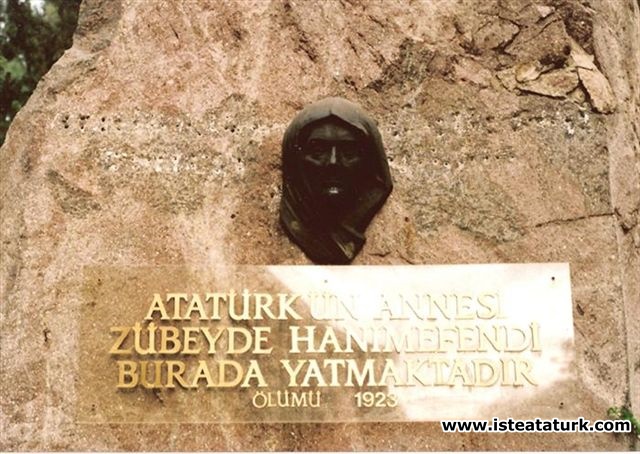
Today's tomb of Zübeyde Hanım.
Source : Atatürk Araştırma Merkezi, Atatürk'ün Annesi Zübeyde Hanım, Cemil Sönmez, 2. Baskı Ankara 1998, ISBN: 975-16-0942-9. Sayfa: 103-104
ZÜBEYDE HANIM'S LIFE
Atatürk's mother, Zübeyde Hanım, was born in Lankaza in 1857, and spent her childhood and early youth here with her family.
Zübeyde Hanım had a strong body structure as well as a strong will. She wasn't educated enough, but she had learned to read and write. She was called "Zübeyde Molla" just as her mother was called "Mullah Hanım". It was a nickname for his "wise" personality. She was a conservative, traditional woman.
Zübeyde Hanım, who was 13-14 years old when they married Ali Rıza Efendi in 1870, as will be explained below, after her husband died, she returned to the family farm in Lankaza for a while with her children, and later made her second marriage with Ragıp Bey, who was her suitor. She was 36 years old at this time. We know that Zübeyde Hanım went to Istanbul for three or five days to see Mustafa Kemal, who graduated from the Military Academy in 1905 and became a Staff Captain and was imprisoned for a short time, and said goodbye to her son from Sirkeci, who will go to Damascus from there. Later on, Mustafa Kemal Pasha, who made an emotional speech at his mother's grave on January 27, 1923, will tell about this event.
Zübeyde Hanım, who resided in Thessaloniki until the end of the Balkan Wars, believed in her son and helped him with valuable suggestions when Mustafa Kemal was attempting to open a branch of the "Homeland and Freedom Society", which he founded here in Damascus with his friends in 1906. has been.
After Thessaloniki was out of our borders at the end of the Balkan Wars, Zübeyde Hanım and her daughter Makbule Hanım came to Istanbul like many Turks. According to the information we have, Ragıp Bey, who is said to have "died in Thessaloniki after the First World War", must have passed away just before this migration event. Because, if he was alive, he should have come to Istanbul with his family.
Zübeyde Hanım settled in the house number 76 in Akaretler, in the Beşiktaş district of Istanbul. Together with his daughter, they started a new but troubled life in Istanbul. While Mustafa Kemal Pasha was fighting against the British in the Sinai Front, in the south of Palestine, as the Commander of the Seventh Army, he resigned from his post and went to Aleppo as a result of a disagreement with the Allied German Armies Commander Falkenhein. Wondering about her son, who had a serious "jaundice" disease here, Zübeyde Hanım went to Aleppo with Mustafa Kemal's son, Mustafa Kemal, whom she feared was blind, by taking Abdürrahim (Tuncok) as an adopted child when he was three years old and left with his mother to raise. He visited Istanbul and returned to Istanbul.
Mustafa Kemal Pasha left the Syrian front on 13 November 1918 and came to Istanbul. Mustafa Kemal Pasha, who went directly to his mother's house, hugged her neck, kissed her hand, and embraced her sister and relieved her longing. It was a happy reunion for the family, who had little reunion in their lives.
Mustafa Kemal, who stayed in Pera Palas Hotel for a few days upon his arrival in Istanbul, was a guest at the house of his close friend Salih Fansa in Beyoğlu for a while. Later, Mustafa Kemal, who rented Madam Kasabya's three-storey house in Şişli, took his mother and sister living in Beşiktaş Akaretler with him, and reserved the third floor of the three-storey house for them. He lived on the middle floor and used the room on this floor facing the back garden as his bedroom. He had reserved the great hall as a meeting room. He was staying downstairs.
Mustafa Kemal had frequent meetings with his friends in this house during the most depressed days of the capital Istanbul, and lived in this house until he went on his journey to Samsun on 16 May 1919. This house in Şişli is now used as a museum.
The days that started with the departure to Samsun will be difficult and painful days for his mother and brother as well as for Mustafa Kemal. Meanwhile, Zübeyde Hanım, who heard the unfounded news that her son Mustafa Kemal "died" and was already sick, became very ill and partially paralyzed.
A pleasing event takes place for Ms. Zübeyde in these troubled days. His daughter Makbule marries Mustafa Mecdi Bey, who left the military and went into business. Zübeyde Hanım returns to the house in Akaretler and continues to live here with her daughter and son-in-law.
These painful, troubled but hopeful days will continue throughout the National Struggle. Zübeyde Hanım's illness was increasing day by day. His mother's stay in Istanbul under siege made Mustafa Kemal sad, and he wrote letters to his mother even when he was in the line of fire. Her friends were helping Zübeyde Hanım and fulfilling all her wishes. It is seen in the telegrams sent mutually that Zübeyde Hanım wanted to see her son before she died and that her son also longed to meet his mother as soon as possible.
Mustafa Kemal, who was separated from his mother for three years, decided to bring his mother to Ankara at a time when the War of Independence was approaching. He was the President of the Turkish Grand National Assembly and the Commander-in-Chief. The year was 1922, and it was June. He was going to meet the French writer Claude Farrére, who requested a meeting with him, in Izmit, and his mother would come from Istanbul. Atatürk arrived in Adapazarı on 14 June 1922. They met with Zübeyde Hanım, who had arrived the day before and stayed at the house of Major Baha Bey, the Head of the Military Service, and spent the night in this house. Together, the mother and son returned to Ankara on 24 June 1922 at 20 o'clock in a car, and went directly to the Çankaya Mansion.
Zübeyde Hanım, who stayed in the mansion with Abdürrahim and Ragıp Bey's niece Fikriye, was getting worse and worse. Zübeyde Hanım, whose pain increased due to partial paralysis and rheumatism, was persuaded to go to İzmir and stay for a while, considering that the weather would be good for İzmir. Another purpose of this trip was to introduce Latife Hanım, whom Mustafa Kemal thought to marry, to Zübeyde Hanım. Chief Adjutant Salih (Bozok) Bey, who went to Izmir to find a suitable place to stay, prepared the summer house of Latife Hanım in Karşıyaka for Zübeyde Hanım.
While she was here, Zübeyde Hanım died on January 15, 1923. She was 66 years old. Gazi Mustafa Kemal Pasha, who had left Ankara on the evening of 14 January 1923 with his special train to go on a long trip in Western Anatolia, arrived in Eskişehir on 15 January. Just before daybreak, Emir called Sergeant Ali, "Is there any news?" Mustafa Kemal Pasha, looking sadly at Ali Sergeant, replied, "The password has been received, but it has not been solved." Said. “I had a dream, I was walking around the green fields with my mother. All of a sudden, a storm came and took my mother away.” When the deciphered telegram was given to him, he read it, closed his eyes, thought for a moment and said, “We are not going to Izmir. Let them turn the train to Izmit,” he said.
On the same day, he sent the following telegram to Chief Aide Salih Bozok in Izmir:
“...the heartbreaking news you gave me greatly affected me. Have the deceased perform the ceremony (appropriately the funeral ceremony) in an appropriate manner. May Allah give life and peace to our nation.”
Asım Gündüz, a classmate of Atatürk from the War Academy and the Chief of Staff of the Western Front in the War of Independence, was in İzmir at the time of Zübeyde Hanım's death. Asım Gündüz describes the funeral of Zübeyde Hanım as follows:
"Zübeyde Hanım had Latife Hanım, who was with her in her last hours, dictated a will. Latife Hanım first informed the Governor of İzmir, Mustafa Abdülhalik (Renda), about the death of Zübeyde Hanım, and the governor had a big funeral ceremony prepared. Thirty-three people from the well-known hafizes of .
Almost the whole of Izmir participated in the funeral procession. Although there were governors, officers, commanders and teachers, the length of the funeral procession was one kilometer. The wreaths brought by the schools formed a cover over the grave. Western Front Chief of Staff Asım, Kazım (Özalp), Fahrettin (Altay), Mürsel (Baki), İzzettin (Çalışlar), Abdurrahman Nafiz (Gürman) Pashas were walking in front of the funeral procession.
Latife Hanım was dressed in a black coat, covered with a black veil, and wanted to join the funeral procession. But when her family and clergy prevented her from attending the funeral in Islam, she got on a carriage and followed the funeral. Latife Hanım distributed alms to hundreds of silver mecidis in her grave, had mevlut read at her forty, and paid the debt of love and gratitude she felt towards this blessed woman by sending hatims to the poor, just as she made ashura on the night of the 52nd and distributed them to the poor.
Mustafa Kemal Pasha, who wandered around various places for about 12-13 days and followed the state affairs in accordance with his schedule, arrived at İzmir-Karşıyaka Station via Manisa on January 27, 1923. He was accompanied by army commanders, ministers, deputies and his aide. İzmir Governor Abdülhalik Renda, Corps Commander Fahrettin Altay and Chief Aide Salih Bozok were among those who welcomed him. Again at the station, a large crowd of people and a car decorated with flowers were waiting for him. He greeted those gathered around him.
He would visit his mother first, just as he had visited his mother first in his health. He gave a touching and concise speech at his mother's grave that day. In his speech, as in his upbringing. He expressed the pain and sacrifice of his mother, who was always on his way during the years of the National Struggle. While expressing the troubles and pain he suffered because of himself, he also expressed his appreciation for his mother.
Atatürk was deeply excited that day. He gave his most sincere and emotional speech at his mother's grave that day. Zübeyde Hanım was a devoted mother. She had made unprecedented efforts in the upbringing of her son. She had longed for her son for years, finally she died shortly after seeing his triumph.
_%203.png)
Mustafa Kemal Pasha is visiting the grave of his mother, Zübeyde Hanım, with Marshal Fevzi Çakmak and Kazım Karabekir Pasha. (27 January 1923)
Mustafa Kemal Pasha, while putting his life and all his assets to save his nation, could not take care of his mother enough. It was these feelings that made him shed tears and tell his deepest feelings when he visited his mother's grave for the first time with a large group. In his speech here, Mustafa Kemal Pasha, briefly talking about his mother's troubles, said:
But I could only meet him there for three or five days. Because again, the spies and executioners of the printing administration surrounded our residence and took me away. My mother followed behind me, crying. While I was being put on the ferry that would take me to my place of exile, my mother, who was prevented from meeting with me, was left in tears and sorrows at Sirkeci dock. The dangers I went through in the place of exile caused his life to pass in pain and tears. Another point: When I crossed into Anatolia at the time of the armistice, I had to leave my mother in Istanbul in a painful state. I had a man with me that he was befriending. The minute I sent this from Erzurum to Istanbul, when my mother was informed that this man had come alone, He thought that the death sentence given by the caliph and the sultan about me had been fulfilled, and this thought paralyzed him. After that, all the years of struggle had made him spend his life in pain and sadness. He was always under the pressure and torture of the Sultan and his government and all the enemies. His residence was raided and searched for a thousand reasons and reasons, and he was disturbed. My mother spent three and a half years in tears all day and night. These tears made him lose his sight. Finally, very recently, I was able to rescue him from Istanbul. I was able to reunite with him that he was now dead materially, living only spiritually ..." He was always under the pressure and torture of the Sultan and his government and all the enemies. His residence was raided and searched for a thousand reasons and reasons, and he was disturbed. My mother spent three and a half years in tears all day and night. These tears made him lose his sight. Finally, very recently, I was able to rescue him from Istanbul. I was able to reunite with him that he was now dead materially, living only spiritually ..." He was always under the pressure and torture of the Sultan and his government and all the enemies. His residence was raided and searched for a thousand reasons and reasons, and he was disturbed. My mother spent three and a half years in tears all day and night. These tears made him lose his sight. Finally, very recently, I was able to rescue him from Istanbul. I was able to reunite with him that he was now dead materially, living only spiritually ..."
"... I am undoubtedly very saddened by the loss of Valde. But there is one thing that relieves me of this sadness and comforts me, and that is to see that the administration that destroyed and destroyed our motherland has been taken to the grave, never to be found again. Valdem is under this soil. , but may the Dominion of Milliye stand forever. This is the greatest force that consoles me. Yes, the Dominion of Nations will continue forever. Let me repeat the oath of conscience that I have committed to Valde's spirit and all the spirit of his ancestors. And I regret that I will never hesitate to go to my lord if it is necessary for the protection and defense of the nation's production and domination by shedding so much blood. It is a debt of conscience and honor for me to give my life for the sake of the National Sovereignty..."
This speech of Mustafa Kemal was instrumental in the hearty cheers of the people of Karşıyaka, and the people applauded him like crazy and shouted, "Long live my pasha... Long live you...".
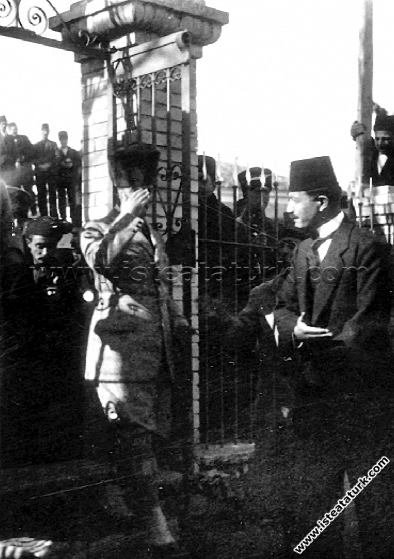
Leaving Ferik Osman Pasha Mosque, where his mother's grave is located, after visiting his mother's grave. (27 January 1923)
Expressing his devotion to Ms. Zübeyde by saying, "My mother and sister, whose virtue and womanhood I believe in, believed in and served me in the revolutionary works," Mustafa Kemal Pasha loved his mother very much. When she heard a song her mother loved, her eyes would tear up. Every morning when he woke up, he would do his cleaning, after getting dressed, he would send a message to his mother for a visit and ask for permission. Zübeyde Hanım would accept her son after she had prepared in the same way. In these meetings, Mustafa Kemal Pasha would kiss his mother's hand and receive her blessing. They would stay and chat with their mother for a while.
Zübeyde Hanım addresses her son as "Mustafam" or "Yellow Mustafam"; most of the time, he would find it rare, addressing or mentioning it as "Paşam" or "Yellow Pasha".
Cevat Abbas Gürer, one of Atatürk's aides-de-camps, who was with him for most of his life, said, "Atatürk's mother, whom he loved and respected very much, and his state in terms of decency and intelligence, in the following words, the state education and training of the "Turkish Mother" who gave birth and raised a national hero. How beautifully he reveals his virtue:
Mrs. Zübeyde was very interested in every situation of her son, who was orphaned at a young age. Because it was a great factor in his upbringing and being useful to the country after he grew up. She had literally been both mother and father to Atatürk.
When she learned that her beloved son Mustafa was sentenced to death, Ms. Zübeyde, who was stricken with sadness despite being extremely vigorous, fell ill and fell into bed. The fact that he could not get accurate information from his son for a long time also caused the disease to progress.
Although Çankaya is now living a happy and contented life that she has given Ms. Zübeyde the opportunity to see and smell her precious and beloved son, she often spends her time in sickness.
It would take a long time to describe Ms. Zübeyde's creation, intelligence and behavior towards her environment. It was a duty for Atatürk not only to be a mother, but to visit this dignified, serious, high-minded great Turkish woman every day. Visits were not made without communication. Because mother and son would not see each other without preparation. The main rule of the relationship between the two was that Atatürk always be the visitor.
As soon as the Eternal Chief woke up in the morning, if he was going to see his mother that day, he would get permission from someone through his mother. Then Atatürk was prepared as if he were going to attend a big ceremony.
Ms. Zübeyde was also preparing to accept Atatürk with great care, even in her sickbed. She combed her hair, covered her embroidered headscarf, and wore a silk gown over her embroidered crepe shirt from the Macedonian wedding dress girl's rich device. And after completing her Istanbulkari colored mashlah and formal attire, she would send the news that she was expecting her son.
Mrs. Zübeyde used to address Atatürk as 'Mustafa'. For years, I have been involved in the privilege of gaining security, trust and affection among this big family. I was often present at the meetings of both elders together.
My eyes that gather together the happiness of raising a great, precious child and the pride of having a precious great mother; yes, I was getting emotional and happy when I saw live examples of how deep and deep-rooted, how decent and serious and how sincere the upbringing in Turkish society and its foundations are. I can say that Mrs. Zübeyde and Atatürk were in love with this mother and son.
This mother started with lullabies that instilled in her son the love of homeland and nation when he was just a cradle child, raised him with feelings in every age, directed him to education, and instilled knowledge and wisdom. He, Mustafa Kemal, had made his son, the savior who had grown up and found his rank.
During each of these visits, Atatürk kissed his mother's blessed hand with great respect. Then that big man would shrink in front of his mother, he would become Mustafa, even Mustafacik. Their conversations, their jokes, were signs of simmering love.
I will present a situation that I witnessed in one of these mother-son meetings in Çankaya as an example of Ms. Zübeyde's fast-paced intelligence, whose value is unlimited:
"Atatürk kissed his mother's hand. Ms. Zübeyde wanted to embrace Atatürk with all the expression of her enthusiasm gathered in her eyes as she extended her hand to her son. After embracing him, she should have been proud to be the mother who gave a unique gift to the Turkish nation. The great Turkish mother, who was read, reached for the hand of her liver, which was moving away in her arms:
Atatürk: "What are you doing mom".. . said.
Mrs Zubeyde said with quiet and absolute solemnity:
"I am your mother, you are doing your duty to me by kissing my hand; but you are a president who saved the homeland and nation. I am also a member of this holy nation and its subject, I can kiss your hand." He gave his answer.
Rather than kissing her son's hand, Ms. Zubeyde was pointing to those around her that her son's rank was worthy of the greatest respect with her gesture."
Dr. Ali Güler
Source: ATATÜRK ARAŞTIRMA MERKEZİ DERGİSİ, Sayı: 45, Cilt: XV, Kasım 1999
